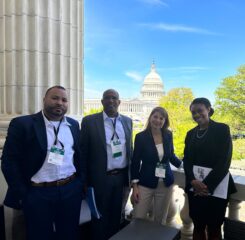Leading through the Pandemic Crisis: Reflections from Leadership Academy Alumni
In preparing to re-launch our Leadership Academy application, I asked our Leadership Academy alumni what they are noticing about leadership in the mist of this pandemic and how they are putting their Academy learnings into practice during this crisis. Here’s what they had to say.
What are you noticing about leadership in the midst of this crisis?
“It’s important to be a leader with an empowered team. Through a crisis there are times when you aren’t as “strong” as you would like to be. It’s great to have team members who can keep things moving forward. I’ve noticed new leadership skills in team members.” –Erica Thrash-Sall, McFarlan Village, MI
Covid-19 is taking a personal toll on aging services leaders. Leading through an unpredictable, extended crisis is exhausting. Losing both residents and staff from a virus is horrific. Those working remotely miss the social interactions with colleagues they had once taken for granted; for those who are onsite, balancing work and home has never been more difficult.
Rest, reflection and networks are important coping strategies. Alumni remind themselves and their team members to find grace in letting things go that are no longer as relevant. In doing so, they make space for rest and reflection, which helps them regain balance and clarity. And they are leveraging their support systems, noting how important it is to reach out to leaders of other organizations to seek advice and guidance. “We are in this together” and “No one organization has all of the answers” are common statements.
Transparency and an abundance of communication is key. Clear, continuous, factual, timely and candid communication has never been more important. Communicating with empathy and authenticity establishes trust and reduces anxiety. Alumni stress that taking the time to check in with people—residents, family, and staff—so they know they matter is important in creating calm and establishing trusting relationships.
Leading with emotional intelligence is not just kind, it’s required. Empathy, compassion, and authenticity are critical components when leading through crisis. Leaders must show their vulnerabilities to be fully transparent and to gain trust and support. Additionally, leaders need to create space for staff to feel supported and safe, while also feeling motivated to get through each day of crisis. It’s imperative to keep morale up with staff, residents, and families. Emotional intelligence is foundational to that effort.
The uncertainty of this pandemic requires a new level of leadership agility. In a constantly changing, uncertain and seemingly unending crisis, alumni reiterate the importance of being able to pivot quickly based on new information and new requirements. Knowing where you want end up is important for perseverance and optimism, but having the flexibility and agility to adapt to new paths to get there has never been more important.
Leading by example instils calm. Leaders need to remain calm and positive, even when they don’t feel that way. Offering clarity and focus reduces anxiety among others. Leaders should also be accessible and visible, and demonstrate confidence in their decisions. Alumni point out that staff, residents and families look to leaders to be dependable and consistent.
Informal leaders are stepping up. A bright spot is emerging in this crisis. Informal leaders are rising up to meet the unforeseen challenges. Alumni report seeing leadership “show up” at all levels, leading with love, care and deeds. They are also seeing team members demonstrating new strengths — a wonderful reminder to leverage the strengths of leaders throughout the organization.
How are you putting your Academy leadership learnings into practice during this pandemic crisis?
The Academy experience for me was such a great foundation and spring board for the leader I am today. It prepared me in so many ways to lead through anything, including this. Something that has really surprised me though, is while the Academy helped prepare me to lead through self-doubt this crisis is a reminder self-doubt is still there because there are so many unknowns and what ifs. Worry sets in and it’s a battle to push it away. I don’t think I would be able to get through it if it wasn’t for the teachings and reassurance the Academy brought me.” Julie Thorsen, Friendship Haven
Finding time for reflection and introspection to gain clarity about what’s happening right now and to reveal possible paths forward. This is especially true when we realize we’re leading through a marathon of uncertainty. Rest and renewal are important to gain clarity and balance, for everyone in an organization. Alumni use different methods from the Academy to reflect, from mindfulness and journaling to periodic assessments of themselves and their emotions. They stress the importance of Sabbath, or a chance to rest the mind, so they can take care of themselves and those who rely on their leadership. A good starting point is remembering who we are and why we serve.
Getting on the balcony to see the bigger picture. Ron Heifetz’s “balcony” concept, one of the first leadership ideas we explore in the Academy, has never been more poignant. Adam Melton, from Galloway Ridge in NC, summarizes it nicely: “The most important item I’ve tried to incorporate from our leadership learnings is remembering the concept of the balcony and the dance floor. In times of crisis, your vision can become narrow, looking to solve individual problems without seeing the impact on others.” That’s when you’re spending too much time on the dance floor. “It is important to take a breath, survey the landscape, and make a timely decision” from the perspective of the balcony.
Leaders who navigate a constant dance between being in the thick of operational details (on the dance floor) and being able to see the bigger, overall picture (from the balcony) are better able to address the urgency of now while preparing for what is to come.
“The Academy really helped me with perspective. I have the tools now to process my feelings, get off the dance floor and observe what is needed from then balcony, then act.” –Erica Thrash-Sall, McFarlan Village
Tools and resources to broaden our perspectives helps with problem-solving and designing a new future. We introduce several tools to ensure we are stretching our own perspectives beyond our own mental models and consistently inviting in the perspectives of all stakeholders. Alums remind us that it’s more important than ever to gain more perspectives and not make assumptions or jump to conclusions.
Jill Vitale-Aussem of The Eden Alternative: ““When I was trying to figure things out in my own head and be the “hero” leader, I couldn’t see the possibilities. I only saw certain failure. When I realized I needed to be vulnerable and transparent and bring in perspectives, we were able to see possibilities and new and exciting opportunities…”
In another Academy read, Presence, co-author Otto Scharmer introduces a theory in which the best learning and reflection, and the greatest opportunity to gain perspective, occurs in the uncomfortable space of uncertainty. Chris Moore of Elizabeth Seton Children’s Center, adds that, because this virus has “touched on every aspect of our professional lives while grinding the nation to a halt, it has afforded us an opportunity to shine a light in some dark places where change and reinvention are desperately needed. If we take this opportunity to evaluate and address these areas of concern before racing ahead to get back to a sense of normalcy, we will be better prepared to respond to whatever the next challenge may be.”
Inspiration from historical leaders who persevered in times of crisis. The great Arctic explorer, Ernest Shackleton, offers a number of leadership learnings. Many alums point out the similarities and connections to the current crisis, in particular how Shackleton, more than 100 years ago, navigated defeat upon defeat, crisis after crisis, with a stoic optimism that eventually allowed him to succeed in getting his crew home safely. This story, indeed, is an Academy favorite.
As Tracy Biesecker of Messiah Lifeways describes with Shackleton in mind, “We know this crisis will end at some point, however none of us know how or, quite frankly, who will survive. Our teams are looking at us for reassurance, and it has been important to be the role of the optimistic to provide them with comfort. All of our team members, from caregivers through to billing team members have been asked to work differently and face new challenges in a short period of time, and our example of leadership has been critical for the success of where our organization is today.”
A nation-wide network of colleagues in aging services. Alums talk about this more than anything else: the relationships they formed with leaders from a variety of settings and disciplines, across the country, and how they leverage those relationships for knowledge, support, inspiration and friendship.
“I have a group of alums from all over the country on a text chain. We have checked in on each other weekly and shared stories of how we are managing, tips, and offered endless support. It’s so refreshing to be able to be a part of something we can all understand and to have support from the best in the business who truly get what we are up against every day.” –Kassie South, Frank at Seaside
“Most important to me has been my connections through the Academy and the support we are able to provide each other. We have a group of 5 of us that still keep in touch nearly every day, and it provides an opportunity to vent and brainstorm and share stories with people who truly understand what kind of crisis we are in. For that, I am eternally thankful! “ –Kristen Schooley, Montreau
In closing, a laundry list of the natural leadership gifts that alums said the Academy helped them uncover, in themselves, that have served them especially well in this time of crisis.
- Being aware of my own influence.
- Being authentic and building trust in times of uncertainty.
- Supporting my team, making sure they know I have their back, bringing the team closer together, and celebrating successes.
- Recognizing that good leaders shoulder responsibility and share praise widely. No team member is unimportant and we need to travel together.
- Knowing when to get out of the way when others are taking the lead and being ready to assist when needed.
- Trusting the team that they are capable and assuring them of my confidence in their abilities.
- Being aware of crucible moments, full of learning, from earlier in my career creates a sense of curiosity and anticipation in spite of the challenges we are facing.
- Staying cool, calm and collected to think and act clearly and proactively.
- Being clear about my intentions; clear with my communications, and truly listening.
- Being flexible; being able to pivot from a plan as circumstances evolve.
- Being aware of how my attitude and approach impact those around me. Most days I try to stay calm and be a voice of reason but allowing myself the opportunity to show emotion and vulnerability during this time I believe has been very helpful for our team.
- Being mindful and true to who I am, acknowledging and embracing areas of strength and shortcomings.
- Being present.
“In the Academy I was taught to be present in the moment and not force things to happen. In a world of having no control, it has forced me to remember how to just be present and deal with things as they come.” –Kim Schilling, Friendship Haven
The Leadership Academy is available to employees of all LeadingAge members, regardless of title or position. Financial assistance is available. The deadline is July 31.
For more, download our latest QuickCasts, Leading through a Crisis: Insights from the Field and Purposeful Reflection: Leading through Uncertainty from the LeadingAge Learning Hub.

Member Recommended
January 13, 2023
Wednesday: Hear From HHS Secretary Becerra
April 05, 2023
Foreign-Born Workers: Workforce Pipeline Opportunity
Recently Added
April 20, 2023
FDA, CDC Make Changes to COVID-19 Vaccination
April 20, 2023


